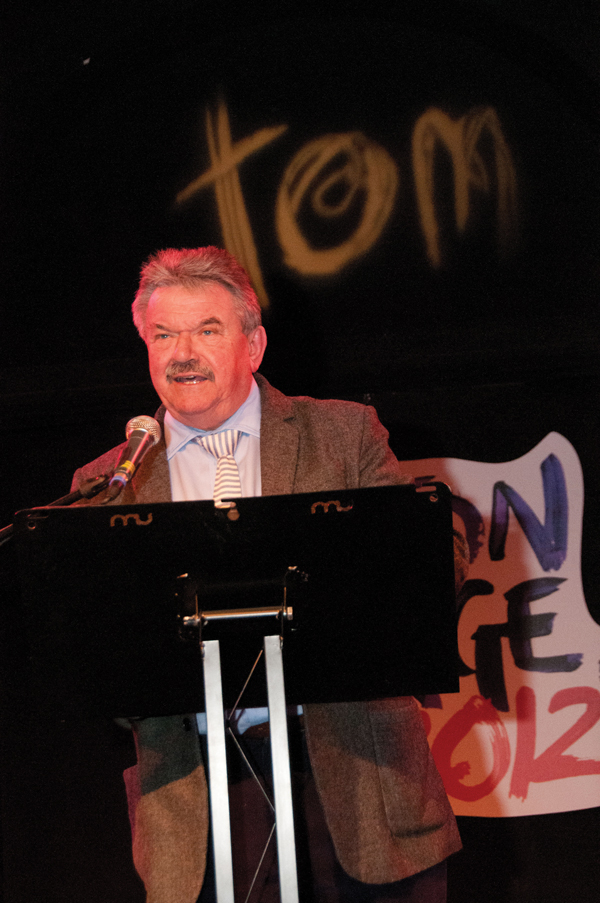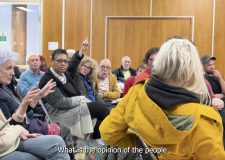Greens make a fair start
Frank le Duc looks back over the Greens’ first year in office and assesses their progress

A year ago the Green party set out a detailed manifesto called “A Fresh Start for a Fair City”. The goals were for the four years to 2015 so it’s too early to judge whether they have totally succeeded or failed to fulfil their promises. But it is possible to check their progress against their own measures numbered 1 to 13.
In the meantime, the city hasn’t been bankrupted despite severe cuts imposed by the government. And there weren’t riots. Although protest camps and travellers prompted much debate. And the row over higher parking charges is rumbling on. Here are the Greens’ own manifesto promises and an interim assessment of how they’re doing.
• 1. Resist, to the greatest extent possible, the service cuts and privatisation imposed on local councils by the Conservative and Lib Dem government. Where the coalition leaves no choice, protect services for children, vulnerable adults and those on low incomes.
The verdict so far: The Greens’ first budget provoked a great deal of debate, particularly their proposal to put up Council Tax to try to mitigate cuts in government grant. Although they were defeated over the Council Tax rise – it has been frozen for the year – most of their budget was voted through. Some cuts intended for next year are having to be brought forward as a result. Given what the law requires, they have covered most of the bases in this area. But council leader Bill Randall warned his colleagues that the task would be tougher next year and the year after.
• 2. End the waste of empty council and privately owned buildings and land to provide affordable workspaces. To help retain small and medium-size businesses in the city and to encourage new enterprises.
The verdict so far: Incoming council leader Jason Kitcat has been overseeing the council’s finances and central services including its property portfolio. A review of council working space is bringing staff together in fewer offices. But there are few signs of empty premises being put to use by businesses on a discernible scale. The Greens have worked hard to keep talking with business leaders although lately this has been overshadowed by strong opposition to the rise in parking charges.
• 3. Retain our commitment to building a new and low carbon Brighton Centre on the seafront. To retain and expand the national and international conference and exhibition trade, which is vital to the city’s economy, and create jobs.
The verdict so far: The existing Brighton Centre has been refurbished and includes power-saving and water-saving technology which will also reduce running costs. But it’s too early to see clear progress on a planned rebuild which will require greater confidence in the private sector. The conference trade does though appear to have picked up after a determined effort to sell Brighton to big conference bookers. Labour and the Liberal Democrats are coming back. Perhaps the Greens and the city’s two Conservative MPs can now persuade their own parties to return to Brighton and Hove.
• 4. Work with Brighton and Hove Seaside Community Homes, housing co-ops, housing associations and the private sector to begin a programme of at least 1,000 new affordable homes. To meet the pressing needs of homeless and poorly housed people across the city.
The verdict so far – Councillor Randall has taken a close interest in empty homes – council houses and flats and privately owned properties. He was deeply involved with the Brighton and Hove Seaside Community Homes scheme when Conservative councillor Mary Mears was leader. This is aimed at refurbishing and bringing back into use 500 council homes. This is a huge policy area and cannot be solved in one year but progress has been made. Work has started at the Open Market and in building council housing at the Ainsworth House site. Park House has been approved in Hove although plans for hundreds of flats at the old London Road Co-op site were turned down as was the big Portzed scheme at the Hove end of Shoreham Harbour.
• 5. Create an ambitious programme to insulate every home in the city and install renewable energy technologies. To cut fuel poverty and energy bills, make homes healthier and slash carbon emissions.
The verdict so far: There have been no serious signs of progress on this policy. Some solar panels have been fitted.
• 6. Produce a Brighton and Hove Housing Design Guide containing minimum acceptable space and design standards for new homes. To ensure all new homes built in the city provide a healthy and comfortable living space for residents.
The verdict so far: Early progress was made on the technical work required to meet the Greens’ objectives which are widely although not universally shared. Deputy leader Councillor Amy Kennedy gave this a good push. The government has changed planning laws and brought in other laws affecting councils. These have held up progress but this is an area where the Greens are almost certainly likely to be able to claim that they have achieved a key policy goal.
• 7. Support high-quality and accessible early years learning and do all we can to protect Bright Start, Sure Start and other nurseries. To give every child in the city a good start in education.
The verdict so far: These facilities have escaped the worst of the spending cuts so far. Some opposition councillors believe that at least some of these services could be better provided by others. The new committees will make it harder for the Greens to win every battle and this may be an area where compromises are made. Quality in this area has been consistently high for some years and keeping it that way will present challenges too.
• 8. Implement a 20mph speed limit for Brighton and Hove’s residential roads. To cut deaths and injuries and make walking and cycling safer.
The verdict so far: Councillor Ian Davey has made rapid progress – faster than 20mph – in bringing in the lower limits around schools and in two trial areas. Expect the scheme to spread. Opposition to the policy is based on the futility of it in much of the city as enforcement is unlikely to be rigorous. As much as anything, it’s a policy that’s about changing mindsets and persuading people to adopt safer driving speeds. Even if the aspirations are met – for blanket 20mph limits in residential streets, there will almost certainly, sadly, still be fatal accidents and serious injuries on our roads.
• 9. Drive up recycling and composting rates, and introduce a food waste collection service. To ensure 70 per cent of all Brighton and Hove’s domestic waste is recycled by 2015.
The verdict so far: Food waste trials have been approved. The 70 per cent target still looks hard to achieve from where we are but much depends on managing the changes to collection rounds and winning hearts and minds. There is a core of people who are keen on recycling and a rump who are resistant. Solid progress is probable even if the Greens’ ambitions may not be met in full.
10. Make Brighton and Hove the number one centre for eco-tourism in the new South Downs National Park. To protect tourism jobs in the city and create new job opportunities.
The verdict so far: Work is under way to try to make Stanmer a key gateway to the national park. This is likely to be completed comfortable by 2015. But the tourist trade is concerned about the effect of higher seafront parking charges. There have been signs of a possible rethink. The Brighton Wheel has opened. The only other new opportunity that looks like going ahead imminently is the i360 now that the council seems prepared to help kickstart the project by the ruins of the West Pier.
• 11. Link together the green spaces of Old Steine, Victoria Gardens and St Peter’s Church and reroute the traffic in Valley Gardens. To create a vibrant new public park for the city centre.
The verdict so far: The early plans have been spelt out but there is a lot of work to do on the detail and a lot of consultation will take place. The dynamics of switching from a cabinet style of running the council back to the old committee system could yet stymie this scheme although Labour also support it, having proposed something similar shortly before they lost power.
• 12. Create local neighbourhood councils with local budgets and decision-making powers. To offer local people a greater say in shaping, delivering and monitoring local council services.
The verdict so far: These are on the cards although the devil is in the detail. It is likely that a pilot scheme in a few neighbourhoods will be used to test the idea. It has been made to work in Sutton, for example, so the Greens are optimistic that it can be replicated here. Too early to judge for sure.
• 13. Roll out a “living wage” for city council employees. Move towards a minimum wage for the lowest paid of £8.10, and introduce a strategy to ensure the highest paid council officer earns no more than eight times the lowest paid officer.
The verdict so far: The Greens are on track to achieve this goal and set up a Living Wage Commission to try to encourage other employers to follow suit, including private sector companies. Tourism, catering and hospitality bosses have been the most resistant. But a number of firms already pay most staff more than the £7.20 “living wage” or have signalled a broad acceptance of the idea.
WHAT THE CRITICS SAY
Councillor Gill Mitchell – Leader of the Labour and Co-operative Group
“The Greens’ first year in office has been an unfortunate mix of discovering that their views and ‘aspirational’ policies are either impractical or vehemently opposed when it comes to their implementation.
“Green ideology is denying the city’s children sufficient, local, high-quality school places as the school place crisis worsens and the Greens refuse to build the proper new schools that children and families deserve. Their ideology is behind the massive increases in car parking charges and the city’s economy is now suffering as the Greens try to price drivers out of their cars without offering any practical alternative such as park and ride.
“Sending out the message that the city should be a ‘protest city’ has been a totally irresponsible act given the very recent violent demonstrations and residents are perplexed as to why unauthorised traveller encampments are allowed to stay for weeks in public parks, even when the Green council has obtained the legal power to move them on.
“To top all this, the Greens could not even get their much trumpeted first budget through the council because they had not taken the steps needed to first strip out the waste from the multi-tiered council bureaucracy and instead tried to pass the expense on to tax-payers by raising council tax.
“The new council leader will need to accept that not everyone in the city shares the Green Party’s narrow view of the world, and as we return to making decisions within the committee system, there has to be genuine involvement and discourse with the opposition parties. But I’m not holding my breath.”
Opposition Conservative group leader Councillor Geoffrey Theobald said: “After a year in office it is becoming increasingly difficult to find anyone who says they will vote Green again. Their main achievement seems to have been to alienate and upset most residents in the city whether it be by their massive parking charge hikes, increasing charges for using sporting facilities or by welcoming travellers, squatters and assorted protestors to the city.
“Fortunately, we managed to prevent them being one of only a tiny minority of councils to put up Council Tax at February’s budget meeting but their intentions are clear – raise taxes and charges as much as they can possibly get away with.
“Having said all that, Councillor Randall has been a very amiable leader of the council and I wish him well as he departs to the safer shores of being the city’s first citizen – I’m sure that he will be a very good mayor.”
Former leader Councillor Mary Mears welcomed progress on Brighton and Hove Community Seaside Homes, the new council housing on the Ainsworth House site and proposals to revamp the Brighton Station Gateway. They were, she said, all projects started by her Conservative administration.
She was disappointed, she said, that the environment and transport portfolio was split in two. She felt that this was wasteful and created unnecessary extra cost. She had some advice too: “They need to be more guarded in their comments. They lay themselves open.” This was a reference to the way she said that they appeared to make Brighton and Hove seem a soft touch for protesters and travellers.
And she added: “They don’t always do their homework and they don’t always read the paperwork.” She predicted that they would face a tougher test as the council ditched the cabinet style of decision-making and returned to all-party committees. She said that looked forward to a u-turn on parking – the sooner the better.
A member of Cityclean staff said that food waste collections were not a done deal in his colleagues’ eyes. He harked back to the shortlived idea of meat-free Mondays – indigestible to the crews, many of whom still prefer a bacon buttie or sausage, egg and chips. He said: “The Greens have definitely got some good ideas and they’re not anti-union, which I like. But let’s just say that meat-free Monday was not exactly our cup of tea. But they’re going need to do a better job of taking us with them when it comes to changing our rounds again.”




















